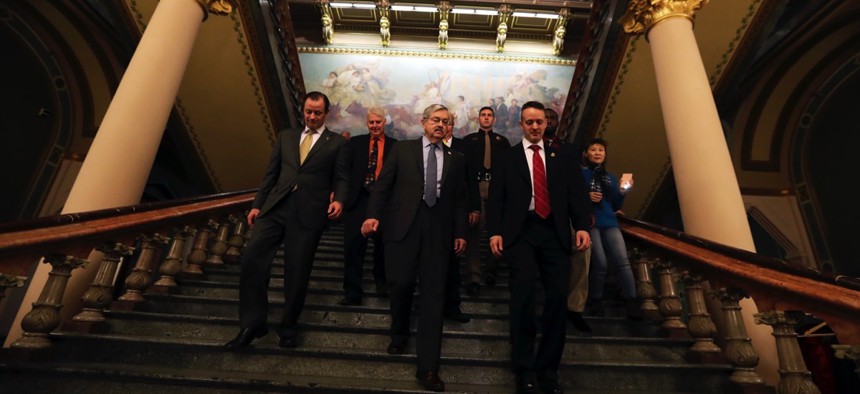Iowa Gov. Details $110 Million in Budget Cuts; Hope vs. Reality in Olympia

Iowa Gov. Terry Branstad, center, is escorted back to his office after delivering his annual condition of the state address before a joint session of the Iowa Legislature on Tuesday. Charlie Neibergall / AP Photo
Also in our State and Local Daily Digest: More state legislative updates; L.A. legal settlements strain city finances; and Denver police horse euthanized after neglect.
STATE LEGISLATURES | Iowa Gov. Terry Branstad delivered his annual Condition of the State Address on Tuesday, calling on state legislators to defund Planned Parenthood and restrict public sector employees from bargaining on health insurance. Branstad, a Republican who is the nation’s longest-serving governor, is expected to resign from office to become the Trump administration’s U.S. ambassador to China. In the meantime, Branstad is looking to cut $110 million from the current budget and has proposed slashing $25.5 million from the Iowa Board of Regents and $8.7 million from community colleges. Also on the chopping block: $20 million from the Department of Human Services and $15 million from corrections. [AP via Sioux City Journal; Radio Iowa; The Des Moines Register; The Gazette]
Washington state lawmakers have convened in Olympia this week to start the 2017 legislative session and although Democratic and Republican leaders in the House and Senate started off with promising words of bipartisan collaboration—“We reject the notion that there are conflicting regions or cultures across the state,” House Speaker Frank Chopp, a Democrat from Seattle, told his colleagues—there are major difficulties ahead, first and foremost, ending the ongoing deadlock over how to solve the Evergreen State’s education-funding crisis. [The Spokesman-Review; The News Tribune]
In Texas, state lawmakers formally kicked off the 140-day legislative session on Tuesday, but don’t expect any major policy action in the near term as there are prohibitions on passing most bills early on in the session. In the House, lawmakers in that chamber elected Joe Straus, a Republican from San Antonio, as speaker for a fifth term. [KSAT-TV; Texas Tribune]
Wyoming state and local government entities would be barred from extending "preferential treatment" to minorities and other groups under a bill in play in the state Legislature. A spokesman for the University of Wyoming said the measure would have no effect on the school’s admission policies. “UW doesn’t have any race-, gender- or ethnicity-based admissions preferences,” he said. [Casper Star Tribune]
In Lincoln, Nebraska, state lawmakers are considering legislation that cap interest rates on payday loans. [Omaha World-Herald]
CITY HALLS | City leaders in Los Angeles will likely need to borrowing money to cover recent legal settlements and court judgments—$135 million this fiscal year. Budget officials said this week that the city may need to borrow up to $70 million to avoid tapping emergency reserves. [Los Angeles Times]
LAW ENFORCEMENT | A Denver Police Department mounted patrol officer will lose one vacation day for leaving his horse, MC Hammer, tied in a stall for 16 hours without food or water. The horse was later euthanized after it developed colic. [The Denver Post]
JURISDICTIONAL TRANSFERS | San Antonio’s city leaders is planning to give two square miles of land to the city of Converse, which is also annexing three square miles of unincorporated Bexar County. The annexation will take about seven years. San Antonio leaders are happy to transfer its land since it’s difficult for the city to provide services there. [Texas Public Radio]
HOUSING | A policy that has allowed real estate developers in Boulder, Colorado to pay the city money, rather than include affordable housing units in their projects, has generated controversy. But city officials say it’s working. [Daily Camera]
MARIJUANA | Pot may be legal in California. But recreational and medical marijuana remains prohibited on federal public lands, including national parks, like Yosemite and Death Valley. “I’d anticipate more people thinking now that it is legal in the park,” said Mike Mitchell, a defense attorney who has represented people busted for pot in Yosemite. “A lot of people don’t recognize that you are going into a completely different jurisdiction; it’s just like going into a different state. A lot of people don’t know that. They just think they’re going into a park, like any other California park.” [McClatchy DC]
PEDESTRIANS | Florida is home to the seven most dangerous metropolitan areas for pedestrians, according to a Smart Growth America report. No. 7, Tampa-St. Petersburg-Clearwater, saw 821 pedestrians killed between 2004 and 2014 while Cape Coral-Fort Myers is the most dangerous metro per capita. State and local governments have made more of an effort to make streets bike- and pedestrian-friendly in more recent years. [Tampa Bay Times / Tampa Bay Online]
NEXT STORY: The Gaps in New York's Free-College Plan





